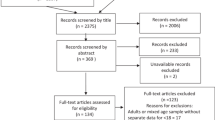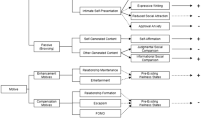Abstract
This study examined the mediating effect of social support on the relationship between older adults’ use of social media and their quality-of-life. We analyzed the 2016 Digital Divide Index of the Korea National Information Society Agency (NIA). Differences in the use of social media, social support, and quality-of-life according to demographic characteristics were assessed via χ2, t−tests, and ANOVA with post-hoc tests (Tukey) using SPSS 23.0. To test the relationships among use of social media, social support, and quality-of-life, regression analysis and the Sobel test were used. The results showed that greater use of social media and perceived social support was present in men versus women, 65–74 year-olds versus those older than 75 years old, those with more education, and those with higher income. The frequency of use of social media by the older adults was low at 24.7% for those 65–74 years old and 5.0% for those older than 75 years old. This results revealed a mediating effect of social support on the relationship between use of social media and quality-of-life and confirmed the mediating effect of social support. Use of social media had not only a direct effect on quality-of-life, but also an indirect effect through social support.

Similar content being viewed by others
References
Ahn, J., Lim, K.-C., Lee, Y.-J., & Kim, K. (2011). Effects of computer/internet game play on depression and life satisfaction among the elderly : Mediating effects of perceived self-control. Journal of The Korean Contents Association, 11(7), 406–417.
Ahn, K.-G., & Ryu, J.-H. (2007). A exploratory study of the internet political participation factor. 23, 113-148. Journal of Cybercommunication Academic Society, 23, 113–148.
Bahramnezhad, F., Chalik, R., Bastani, F., Taherpour, M., & Navab, E. (2017). The social network among the elderly and its relationship with quality of life. Electronic Physician, 9(5), 4306–4311.
Ban, H., & Lee, H.-J. (2011). Political cognitive structure of different social media user groups: A comparison between multi users, twitter users, Facebook user and non-users using the Galileo model. Journal of Communication Research, 48(2), 5–43.
Bargh, J. A., & Mckenna, K. Y. (2004). The internet and social life. Annual Review of Psychology, 55, 573–590. https://doi.org/10.1146/annurev.psych.55.090902.141922.
Baron, R. M., & Kenny, D. A. (1986). The moderator-mediator variable distinction in social psychological research: Conceptual, strategic, and statistical considerations. Journal of Personality and Social Psychology, 51(6), 1173–1182.
Bell, C., Fausset, C., Farmer, S., Nguyen, J., Harley, L., & Fain, W.B. (2013). Examining social media use among older adults. In: Presented at the Proceedings of the 24th ACM Conference on Hypertext and Social Media,p. 158–163.
Boyd, D., & Ellison, N. (2007). Social network sites: Definition, history, and scholarship. Journal of Computer-Mediated Communication, 13, 210–230. https://doi.org/10.1111/j.1083-6101.2007.00393.x.
Brehm, S. S., & Kassin, S. M. (1993). Social support in later adult. Social Psychological Medicine, 6, 238–247.
Caplan, S. E. (2003). Preference for online socialinteraction a theory of problematic internet use and psychosocial well-being. Communication Research, 30(6), 625–648.
Carol, D. (2005). The relationship between social support and well-being among the elderly. Degree master of social work. Long Beach: California State University.
Chey, Y., & Kim, J. (2018). The mediating of self-efficacy and social support on the relationship between interactive SNS usage of smart devices and depression in the elderly. Korean Journal of Clinical Psychology, 37(2), 166–177.
Choi, J. E., & Lee, D. H. (2013). The impact of SNS network’s features on the formation of social capital. Korean Management Review, 42(3), 719–741.
Coelho, J., & Duarte, C. (2016). A literature survey on older adults’ use of social network services and social applications. Computers in Human Behavior, 58, 187–205. https://doi.org/10.1016/j.chb.2015.12.053.
Cohen, S., & Wills, T. A. (1985). Stress, social support and the buffering hypothesis. Psychology Bulletin, 98(2), 310–357.
Coker, A. L., Sanderson, M., Ellis, G. L., & Fadden, M. K. (2006). Stress, coping, social support, and prostate cancer risk among older African American and Caucasian men. CRVAW Family Journal Article, 100, 978–987.
Colins, G. A. (2003). Rethinking retirement in the context of an aging workforce. Journal of Career Development, 30(2), 145–157.
Cotten, S. R., Ford, G., Ford, S., & Hale, T. M. (2014). Internet use and depression among retired older adults in the United States: A longitudinal analysis. The Journals of Gerontology Series B: Psychological Sciences and Social Sciences, 69(5), 763–771.
Ellis, N., Steinfield, C., & Lampe, C. (2007). The benefits of Facebook “ Friends.” Social capital and college students’ use of online social network sites. Journal of Computer-Mediated Communication, 12(4), 1143–1168. https://doi.org/10.1111/j.1083-6101.2007.00367.x.
Eveland, W. P., Jr. (2003). A “mix of attributes” approach to the study of media effects and new communication technologies. Journal of Communication, 53, 395–410.
Furlong, M. S. (1989). An electronic community for older adults; the senior net. Journal of Communication, 39(3), 145–153.
Gallienne, R. L., & Brennan, P. E. (1993). Alzheimer caregivers: Psychosocial support via computer networks. DEC: Journal of Gerontology.
Ha, E. H., & Lee, Y. W. (2004). Difference in self-esteem and quality of life according to perceived social support in institutionalized elderly people. Journal of Korean Gerontological Nursing, 6(1), 47–54.
House, J. S. (1981). Work stress and social support. Reading: Addison-Wesley.
Jyoti, C., Sutee, P., Efpraxia, Z., & George, G. (2014). Investigating the adoption and use of samartphones in the UK: A silver-surfers perspective. Twenty Second European Conference on Information Systems, 1–19.
Karavidas, M., Lim, N. K., & Katsikas, S. L. (2005). The effects of computers on older adults users. Computers in Human Behavior, 21(5), 697–711. https://doi.org/10.1016/j.chb.2004.03.012.
Katz, J., & Rice, R. E. (2003). Social consequences of internet use: Access, involvement and interaction. Info, 5(4), 46. https://doi.org/10.1108/14636690310495274.
Kim, H. J. (2013). A study on UI design direction for smart phone considering elderly users: Based on smart phone user experience modelling of elderly users. Digital Design Science Research, 13(4), 405–413.
Kim, H. S. (1994). The quality of life according to the economic state, degree of social activity, and social support in elderly people, degree master of social work. Korea: Cheonam University.
Kim, J.-M., Kim, S.-J., Lee, I.-S., & Kim, J.-W. (2009). Social network service research for quality of life of older adults: Comparing old and young adults using qualitative and quantitative analysis. The HCI Society of Korea., 799–810.
Kim, M. Y., & Jeon, H. J. (2017). The effects of smartphone use on life satisfaction in older adults:The mediating role of participation in social activities. Korean Journal of Gerontological Social Welfare, 72(3), 343–370.
Kim, S.-H., & Kim, O.-T. (2015). The format of Mobil new. Foundation: Korea Press.
Kim, Y-H. (2016). Social media use tendency and behavior. KISDISTAT REPORT, 16.
Kraut, R., Patterson, M., Lundmark, V., Kiesler, S., Mukopadhyay, T., & Scherlis, W. (1998). Internet paradox: A social technology that reduces social involvement and psychological well-being. American Psychologist, 53(9), 1017–1031.
Lee, B.-J., & Myeong, S. (2010). The impact of informatization awareness and internet usage on the formation of social network in the elderly: Focusing on metropolitan city. Journal of Korean Association for Regional Information Society, 13(4), 51–179.
Lee, D. (2007), Older adults face facebook mystery, ABC News.
Lin, N., & Dean, A. (1977). Stress-buffering of social support. Journal of Nervous and Mental Disease, 165(6), 403–417.
Liu, Y., & Tasi, Y. R. (2012). The impact of social networking service (SNS) on college students’ social relationship and private life. International Journal of Arts and Commerce, 1(4), 1–10.
Madden, M. (2010). Older adults and social media: Social networking use among those ages 50 and older nearly doubled over the past year. Pew Research Center.
Maier, C., Laumer, S., & Eckhardt, A. (2011). Technology adoption by elderly people – An empirical analysis of adopters and non-adopters of social networking sites. In A. Heinzl, P. Buxmann, O. Wendt, & T. Weitzel (Eds.), Theory-guided modeling and empiricism in information systems research (pp. 85–110). Heidelberg: Physica-Verlag HD.
Murrell, S. A., Chipley, A., & Norris, F. H. (1992). Functional versus structural social support, desirable events and positive affect in older adults. Psychology and Aging, 7, 562–570.
Nie, N. H., & Hillygus, D. S. (2002). The impact of internet use on sociability: Time-diary finding. IT & Society, 1(1), 1–20.
Park, Y. S., Lee, K. M., & Lee, J. W. (2012). The type of social capital formed on social networking services (SNS) and their effects on consumer preference for a product type. Korean Academic Society of Business Administration, 41(6), 1619–1641.
Pavot, W., & Diener, E. (2009). The affective and cognitive context of self-reported measures of subjective well-being. Social Indicators Research, 28, 1–20. https://doi.org/10.1007/BF01086714.
Pennins, B. W. J. H., Tilburg, T. V., Kriegsman, D. M. W., Boeke, A. J. P., Deeg, D. J. H., & Eijk, J. T. M. (1999). Social network, social support, and loneliness in older person with different chronic diseases. Journal of Aging and Health, 11(2), 151–168.
Pfeil, U. (2007). Online social support for older people. ACM SIGACCESS Accessibility and Computing, 88, 3–8.
Razurel, C., & Kaiser, B. (2015). The role of satisfaction with social support on the psychological health of primiparous mothers in the perinatal period. Women & Health, 2015(55), 167–186.
Shah, D., Kwak, N., & Holbert, R. (2001). “Connecting” and “disconnecting” with civic life: Patterns of interent use of and the production of social capital. Political Communication, 18, 141–162.
Shin, J. W., & Kwon, J. S. (2017). An evaluative study on communication enhancement program through social network service of older adults in the community. Korean Journal of Family Welfare, 58, 151–179.
Shin, S.-Y., & Lee, S.-W. (2012). The influence of social capital: Focusing on Twitter & Facebook users’ participation. Journal of Cyber communication Academic Society, 29(4), 191–232.
Shin, Y. J. (2005). The use of IT education for the empowerment of older adults. Journal of Lifelong Education, 11(4), 33–53.
Stellefson, M., Chaney, B., Barry, A. E., Chavarria, E., Tennant, B., Walsh-Childers, K., Sriram, P. S., & Zagora, J. (2013). Web 2.0 chronic disease self-management for older adults: A systematic review. Journal of Medical Internet Research, 15(2), e35. https://doi.org/10.2196/jmir.243918.
Sum, S., Mathews, R., Haghes, L., & Compbell, A. (2008). Internet use and loneliness in older adults. Cyber Psychology and Behavior, 1(2), 208–211. https://doi.org/10.1089/cpb.2007.0010.
Thoits, P. (1983). Conceptual methodological and theoretical problems studying social support as a buffer against life stress. Journal of Gerontology, 39(3), 309–314.
Thompson, M. (1996). Computer technology: How it impact the lives of older adults. Aging International, 23(1), 85–91.
Vedder, P., Boekaerts, M., & Seegers, G. (2005). Perceived social support and well being in school: The role of students’ ethnicity. Journal of Youth and Adolescent, 34(3), 269–278. https://doi.org/10.1007/s10964-005-4313-4.
White, H., McConnell, E., Clipp, E., Bynum, L., & Teague, C. (1999). Surfing the net in later life: Areview of the literature and pilot study and computer use and quality of life. Journal of Applied Gerontology, 18(3), 358–378.
Wright, K. (2006). Computer-mediated social support, older adults, and coping. Journal of Communication, 50(3), 100–118. https://doi.org/10.1111/j.1460-2466.2000.tb02855.x.
Zimet, G. D., Dahlem, N. W., Zimet, S. G., & Farley, G. K. (1988). The multidimensional scale of perceived social support. Journal of Personality Assessment, 52(1), 30–41.
Author information
Authors and Affiliations
Corresponding author
Ethics declarations
Conflict of Interest
The authors declare that they have no conflict of interest.
Ethical Approval
For this type of study, formal consent was not required since it is a retrospective study.
Informed Consent
Informed consent was obtained from all patients for being included in the study.
Additional information
Publisher’s note
Springer Nature remains neutral with regard to jurisdictional claims in published maps and institutional affiliations.
Rights and permissions
About this article
Cite this article
Nam, SJ. Mediating effect of social support on the relationship between older adults’ use of social media and their quality-of-life. Curr Psychol 40, 4590–4598 (2021). https://doi.org/10.1007/s12144-019-00399-3
Published:
Issue Date:
DOI: https://doi.org/10.1007/s12144-019-00399-3




